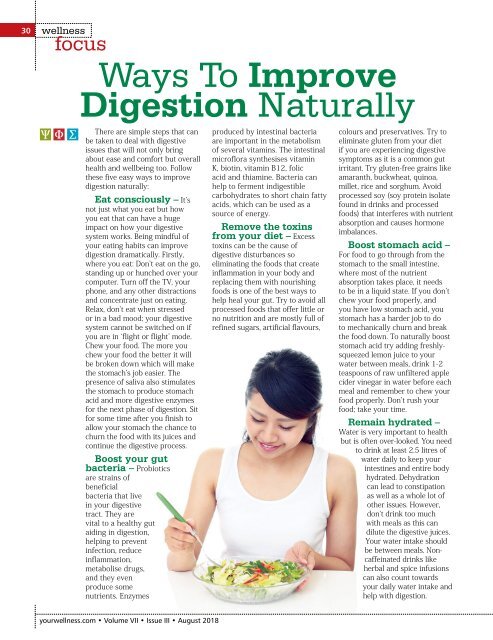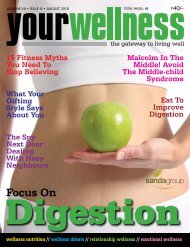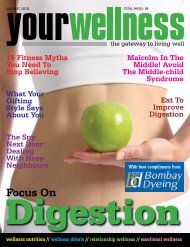You also want an ePaper? Increase the reach of your titles
YUMPU automatically turns print PDFs into web optimized ePapers that Google loves.
30 wellness<br />
focus<br />
Ways To Improve<br />
Digestion Naturally<br />
There are simple steps that can<br />
be taken to deal with digestive<br />
issues that will not only bring<br />
about ease and comfort but overall<br />
health and wellbeing too. Follow<br />
these five easy ways to improve<br />
digestion naturally:<br />
Eat consciously – It’s<br />
not just what you eat but how<br />
you eat that can have a huge<br />
impact on how your digestive<br />
system works. Being mindful of<br />
your eating habits can improve<br />
digestion dramatically. Firstly,<br />
where you eat: Don’t eat on the go,<br />
standing up or hunched over your<br />
computer. Turn off the TV, your<br />
phone, and any other distractions<br />
and concentrate just on eating.<br />
Relax, don’t eat when stressed<br />
or in a bad mood; your digestive<br />
system cannot be switched on if<br />
you are in ‘flight or flight’ mode.<br />
Chew your food. The more you<br />
chew your food the better it will<br />
be broken down which will make<br />
the stomach’s job easier. The<br />
presence of saliva also stimulates<br />
the stomach to produce stomach<br />
acid and more digestive enzymes<br />
for the next phase of digestion. Sit<br />
for some time after you finish to<br />
allow your stomach the chance to<br />
churn the food with its juices and<br />
continue the digestive process.<br />
Boost your gut<br />
bacteria – Probiotics<br />
are strains of<br />
beneficial<br />
bacteria that live<br />
in your digestive<br />
tract. They are<br />
vital to a healthy gut<br />
aiding in digestion,<br />
helping to prevent<br />
infection, reduce<br />
inflammation,<br />
metabolise drugs,<br />
and they even<br />
produce some<br />
nutrients. Enzymes<br />
produced by intestinal bacteria<br />
are important in the metabolism<br />
of several vitamins. The intestinal<br />
microflora synthesises vitamin<br />
K, biotin, vitamin B12, folic<br />
acid and thiamine. Bacteria can<br />
help to ferment indigestible<br />
carbohydrates to short chain fatty<br />
acids, which can be used as a<br />
source of energy.<br />
Remove the toxins<br />
from your diet – Excess<br />
toxins can be the cause of<br />
digestive disturbances so<br />
eliminating the foods that create<br />
inflammation in your body and<br />
replacing them with nourishing<br />
foods is one of the best ways to<br />
help heal your gut. Try to avoid all<br />
processed foods that offer little or<br />
no nutrition and are mostly full of<br />
refined sugars, artificial flavours,<br />
colours and preservatives. Try to<br />
eliminate gluten from your diet<br />
if you are experiencing digestive<br />
symptoms as it is a common gut<br />
irritant. Try gluten-free grains like<br />
amaranth, buckwheat, quinoa,<br />
millet, rice and sorghum. Avoid<br />
processed soy (soy protein isolate<br />
found in drinks and processed<br />
foods) that interferes with nutrient<br />
absorption and causes hormone<br />
imbalances.<br />
Boost stomach acid –<br />
For food to go through from the<br />
stomach to the small intestine,<br />
where most of the nutrient<br />
absorption takes place, it needs<br />
to be in a liquid state. If you don’t<br />
chew your food properly, and<br />
you have low stomach acid, you<br />
stomach has a harder job to do<br />
to mechanically churn and break<br />
the food down. To naturally boost<br />
stomach acid try adding freshlysqueezed<br />
lemon juice to your<br />
water between meals, drink 1-2<br />
teaspoons of raw unfiltered apple<br />
cider vinegar in water before each<br />
meal and remember to chew your<br />
food properly. Don’t rush your<br />
food; take your time.<br />
Remain hydrated –<br />
Water is very important to health<br />
but is often over-looked. You need<br />
to drink at least 2.5 litres of<br />
water daily to keep your<br />
intestines and entire body<br />
hydrated. Dehydration<br />
can lead to constipation<br />
as well as a whole lot of<br />
other issues. However,<br />
don’t drink too much<br />
with meals as this can<br />
dilute the digestive juices.<br />
Your water intake should<br />
be between meals. Noncaffeinated<br />
drinks like<br />
herbal and spice infusions<br />
can also count towards<br />
your daily water intake and<br />
help with digestion.<br />
yourwellness.com • Volume VII • Issue III • <strong>August</strong> <strong>2018</strong>
















